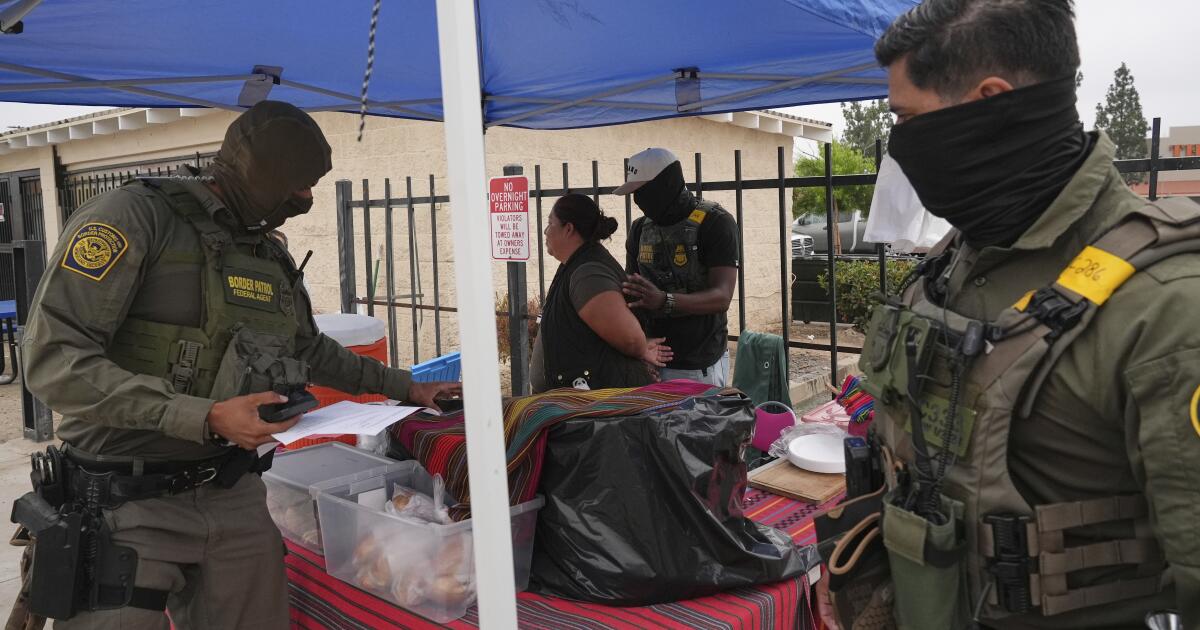The Los Angeles County Board of Supervisors this week approved a state of emergency that could benefit tenants and others hurt by the Trump administration’s immigration crackdown.
The action Tuesday is one of most sweeping efforts by local authorities to push back at raids that have targeted several major American cities since the summer and comes amid weeks of clashes among immigration officers, protesters and others on the streets of Chicago.
The proclamation allows local agencies to expedite the hiring of government positions needed to assist tenants and sets the stage for a future eviction moratorium for households that have lost income due to the raids.
In June, Los Angeles County became the first area under the current Trump administration to see widespread immigration raids in public, which netted thousands of people, and local officials say they are using those experiences to craft protections.
The raids have prompted some to go underground out of fear of being arrested.
A study from UC Merced calculated that the mass deportation of California’s undocumented residents — who make up an estimated 8% of California’s workforce — would create a $275-billion hole in the state’s economy.
The proclamation, introduced by Supervisors Lindsey Horvath and Janice Hahn, allows the country to coordinate interagency response and request state and federal assistance to help affected communities, according to a news release from Horvath.
“What’s happening in our communities is an emergency — and Los Angeles County is treating it like one,” Horvath said. “Declaring a Local Emergency ensures that the full weight of County government is aligned to support our immigrant communities who are being targeted by federal actions. For months, families have lived under threat and workers have been taken from job sites.”
Tenants who can prove they are affected by the state of emergency cannot be evicted for unpaid rent under eviction moratoriums, but they still owe back rent once the moratorium expires.
However, the eviction moratorium could have unintended consequences because it could mean the immigration status of residents is revealed to their landlord if they use it to fight an eviction order in court. The proclamation also faces the possibility of lawsuits or backlash from the Trump administration.
Historically, states of emergency have been declared during natural disasters; however, county staff said the criteria for such an action could be applied to the hardships generated by immigration raids.
The proclamation will be in effect until terminated by the Board of Supervisors.
Several groups that work with immigrants in the region welcomed the board’s vote.
“This is a step in the right direction about materially showing up for the immigrant community in Los Angeles,” said Jonathan Coleman, spokesman for the Garment Worker Center.
He said he knows many people who are afraid to go to work or shop because of the raids and this will help them meet basic needs like paying for food or medicine.
Angelica Salas, director of the Coalition for Humane Immigrant Rights, agreed. She said mixed-status families and those with small businesses could use the help.
“There is a harm that we all have to confront, and maybe you aren’t an immigrant and you haven’t been impacted, but believe me, if we don’t do anything about what’s happening, then our economic well-being and the future of our region will be impacted,” Salas said.
The move comes as local governments across the Southland move to help immigrants caught up in the raids. Top California officials, including Mayor Karen Bass and Gov. Gavin Newsom have decried the raids.
In July, Bass announced a plan to provide direct cash assistance to people who have been affected. The aid will be distributed using cash cards with a “couple hundred” dollars on them, which should be available in about a week, Bass said at a news conference.
The mayor emphasized that the money will not come from city coffers but from philanthropic partners. The cards will be distributed by immigrant rights groups such as Salas’ organization. Santa Ana created a $100,000 fund to help affected families cover basic necessities such as food, rent and utilities.
In September, Newsom signed a package of bills aimed at protecting immigrants in schools, hospitals and other areas targeted by federal agents. He also signed a bill that bans federal agents from wearing masks, making California the first state to do so.

